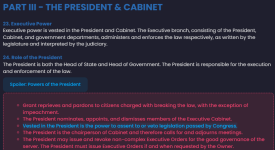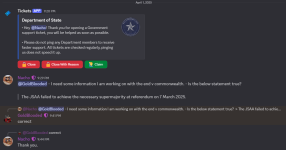- Joined
- Apr 7, 2020
- Messages
- 3,274
- Thread Author
- #1
Case Filing
IN THE FEDERAL COURT OF THE COMMONWEALTH OF REDMONT
CIVIL ACTION
End
Plaintiff
v.
Commonwealth
Defendant
COMPLAINT
The Plaintiff complains against the Defendant as follows:
The Executive has failed in it's duties and Judicial intervention is required.
I. PARTIES
1. xEndeavour
2. Commonwealth
II. FACTS
1. On 13 February 2025, the Judicial Standards Amendment Act (JSAA) was proposed to amend the Judicial Standards Act.
2. On or around 25 February 2025, the JSAA was passed by the House of Representatives.
3. On or around 26 February 2025, the JSAA was passed by the Senate.
4. On or around 5 March 2025, the JSAA was erroneously put to public referendum by the Defendant despite the absence of a requirement for such a referendum under the circumstances.
5. The JSAA failed to achieve the necessary supermajority at referendum on 7 March 2025.
6. The New Constitution of the Commonwealth was enacted on 8 March 2025, and became the governing legal framework.
7. On 16 March 2025, the President was informed that the JSAA did not require a referendum, as it did not constitute a complex or constitutional change, but rather sought to remove redundant language from the Judicial Standards Act.
8. The President, despite being duly informed, failed to act on the JSAA within the time frame established by the Constitution, which mandates that assent is presumed to have been given after 14 days.
9. As of the date of filing, the JSAA has passed into law, and the Defendant has failed to take appropriate action to implement the changes mandated by the JSAA, including ensuring compliance with the provisions of the New Constitution.
III. CLAIMS FOR RELIEF
1. The Defendant wrongly subjected the JSAA to a public referendum, despite the fact that the provisions of the JSAA did not constitute a complex or constitutional change and therefore did not meet the criteria for such a referendum.
2. The President's failure to act on the JSAA within the 14-day period, as outlined in the Constitution (25(3)), constitutes a failure to fulfill an essential constitutional duty. Under the Constitution, assent is presumed after the 14-day period, and the Defendant has acted in contravention of this mandate.
3. The enactment of the New Constitution superseded any pre-existing statutory provisions that conflicted with its terms. The JSAA was intended to address redundant provisions in the Judicial Standards Act, which were in conflict with the newly enacted Constitution. The sections of the Constitution that the JSAA sought to amend carry constitutional weight, while the Judicial Standards Act is only statutory. Herein lies a conflict which annuls the sections the JSAA seeks to remove.
4. The Defendant has neglected its duty to carry out the changes mandated by the Constitution and the JSAA.
IV. PRAYER FOR RELIEF
The Plaintiff seeks the following from the Defendant:
1. Issue a Writ of Mandamus compelling the Defendant to comply with the provisions of the JSAA, in accordance with the statutory and constitutional obligations, and to take immediate action to remove redundant statutory provisions that conflict with the New Constitution.
2. Declare that the President’s failure to act within the constitutionally prescribed 14-day period has resulted in the automatic assent of the JSAA, and that the Commonwealth is bound to implement the changes as required by law.
3. Declare that the JSAA did not require a public referendum and was not a complex or constitutional change, thus rendering the Defendant's actions in submitting the bill to referendum a violation of the congressional process.
By making this submission, I agree I understand the penalties of lying in court and the fact that I am subject to perjury should I knowingly make a false statement in court.
DATED: This 30th day of March 2025








